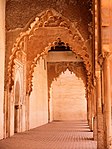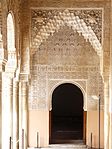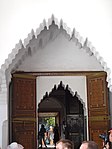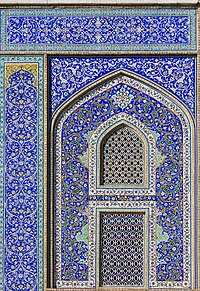
The lambrequin arch, [1] [2] [3] [4] also known as (or related to) the muqarnas arch, [5] [4] is a type of arch with an ornate profile of lobes and points. It is especially characteristic of Moorish and Moroccan architecture.
The "muqarnas arch" is both another name for this type of arch as well as a more specific type of arch whose intrados (inner surfaces) are made up of muqarnas sculpting, which has a very close resemblance to the lambrequin arch. [4] Some scholars speculate that the lambrequin arch was itself derived from the use of muqarnas in archways. [6]: 232 [3]: 123 Moreover, lambrequin arches were indeed commonly used with muqarnas sculpting along the intrados of the arch. [6] [7] [1] Its origins are also traced further back to the "mixtilinear" arches seen in the oratory of the 11th-century Aljaferia Palace in Zaragoza. [4]
This type of arch was introduced into the Maghreb and Al-Andalus regions during the Almoravid period (11th-12th centuries), with an early appearance in the funerary section of the Qarawiyyin Mosque (in Fez) dating from the early 12th century. [6]: 232 It was a Maghrebi innovation that grew in importance during the following Almohad period. [3]: 123 It remained common in the subsequent architecture of the region, in many cases used to highlight the arches near the mihrab area of a mosque. [6] [8] [9] [3] Muqarnas arches are also found abundantly the Alhambra palaces in Granada, for example, particularly the Court of Lions. [4]
-
Lambrequin arches in the qibla aisle of the Mosque of Tinmal (mid-12th century)
-
A lambrequin or "muqarnas" arch with muqarnas decoration in the Madrasa al-Attarine, Fes (1323-1325)
-
A muqarnas arch (top) in the gallery of the Courtyard of the Lions in the Alhambra, Granada (14th century)
-
Lambrequin arches in the Bahia Palace in Marrakesh, Morocco (late 19th century)
See also
References
- ^ a b Parker, Richard (1981). A practical guide to Islamic Monuments in Morocco. Charlottesville, VA: The Baraka Press.
- ^ Erzini, Nadia (2006). "The Survival of Textile Manufacture in Morocco in the Nineteenth Century". In Behrens-Abouseif, Doris; Vernoit, Stephen (eds.). Islamic Art in the 19th Century: Tradition, Innovation, And Eclecticism. Brille. p. 176. ISBN 9789004144422.
- ^ a b c d Bloom, Jonathan M. (2020). Architecture of the Islamic West: North Africa and the Iberian Peninsula, 700-1800. Yale University Press. ISBN 9780300218701.
- ^ a b c d e De Montéquin, François-Auguste (1991). "Arches in the Architecture of Muslim Spain: Typology and Evolution". Islamic Studies. 30 (1/2): 67–82 – via JSTOR.
- ^ Ragette, Friedrich (2003). Traditional Domestic Architecture of the Arab Region. Edition Axel Menges. p. 47. ISBN 9783932565304.
- ^ a b c d Marçais, Georges (1954). L'architecture musulmane d'Occident. Paris: Arts et métiers graphiques.
- ^ Maslow, Boris (1937). Les mosquées de Fès et du nord du Maroc. Paris: Éditions d'art et d'histoire.
- ^ Salmon, Xavier (2018). Maroc Almoravide et Almohade: Architecture et décors au temps des conquérants, 1055-1269. Paris: LienArt.
- ^ Salmon, Xavier (2016). Marrakech: Splendeurs saadiennes: 1550-1650. Paris: LienArt. ISBN 9782359061826.





